高中英语强调句
高中英语语法总结:强调句
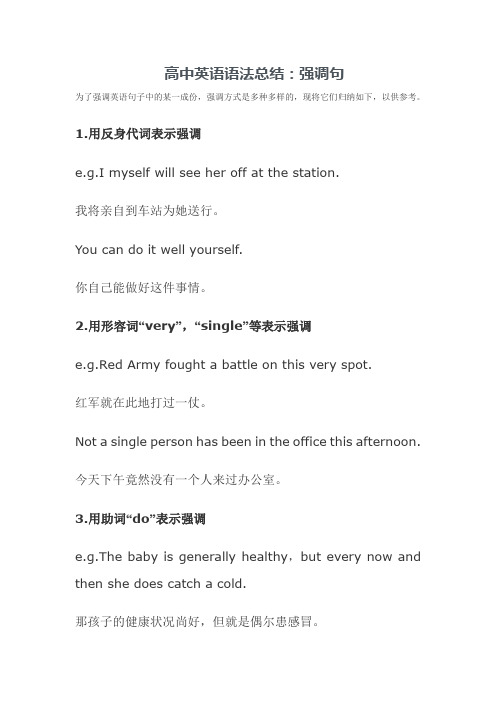
高中英语语法总结:强调句为了强调英语句子中的某一成份,强调方式是多种多样的,现将它们归纳如下,以供参考。
1.用反身代词表示强调e.g.I myself will see her off at the station.我将亲自到车站为她送行。
You can do it well yourself.你自己能做好这件事情。
2.用形容词“very”,“single”等表示强调e.g.Red Army fought a battle on this very spot.红军就在此地打过一仗。
Not a single person has been in the office this afternoon.今天下午竟然没有一个人来过办公室。
3.用助词“do”表示强调e.g.The baby is generally healthy,but every now and then she does catch a cold.那孩子的健康状况尚好,但就是偶尔患感冒。
Do be quiet.I told you I had a headache.务必安静,我告诉过你,我头疼。
4.用副词“very”,“only”,“even”,“too”等表示强调e.g.He drank it to the very last drop.他把它喝得一干二净。
Only in this way can we wipe out the enemy troops.只有用这样的方法我们才能消灭敌军。
He didn't answer even my letter.他甚至连我的信都未回。
I will too go!我要去的!5.用“...and that”,“...and those”,“not...too much”,“否定加否定”等结构表示强调e.g.They fulfilled the task,and that in a few days.他们在几天内完成的就是那项任务。
高中英语---强调句型
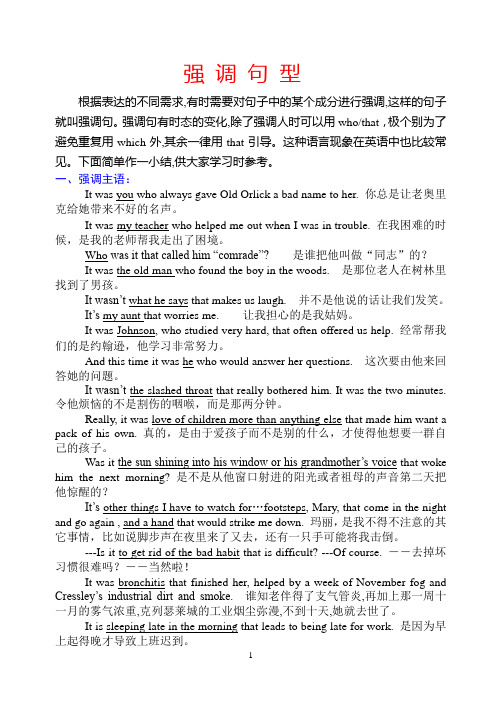
强调句型根据表达的不同需求,有时需要对句子中的某个成分进行强调,这样的句子就叫强调句。
强调句有时态的变化,除了强调人时可以用who/that,极个别为了避免重复用which外,其余一律用that引导。
这种语言现象在英语中也比较常见。
下面简单作一小结,供大家学习时参考。
一、强调主语:It was you who always gave Old Orlick a bad name to her. 你总是让老奥里克给她带来不好的名声。
It was my teacher who helped me out when I was in trouble. 在我困难的时候,是我的老师帮我走出了困境。
Who was it that called him “comrade”?是谁把他叫做“同志”的?It was the old man who found the boy in the woods.是那位老人在树林里找到了男孩。
It wasn’t what he says that makes us laugh.并不是他说的话让我们发笑。
It’s my aunt that worries me.让我担心的是我姑妈。
It was Johnson, who studied very hard, that often offered us help. 经常帮我们的是约翰逊,他学习非常努力。
And this time it was he who would answer her questions.这次要由他来回答她的问题。
It wasn’t the slashed throat that really bothered him. It was the two minutes. 令他烦恼的不是割伤的咽喉,而是那两分钟。
Really, it was love of children more than anything else that made him want a pack of his own. 真的,是由于爱孩子而不是别的什么,才使得他想要一群自己的孩子。
高中英语语法之强调句及练习题

高中英语语法之强调句及练习题一、强调句句型1.陈述句的强调句型:It is/was+被强调部分(通常是主语、宾语或状语)+that/who(当强调主语且主语指人)+其他部分。
e.g.It was yesterday that he met Li Ping.2.一般疑问句的强调句型:同上,只是把is/was提到it 前面。
e.g.Was it yesterday that he met Li Ping?3.特殊疑问句的强调句型:被强调部分(通常是疑问代词或疑问副词)+is/was+it+that/who+其他部分?e.g.When and where was it that you were born?4.强调句例句:针对I met Li Ming at the railway station yesterday.句子进行强调。
强调主语:It was I that(who)met Li Ming at the railway station yesterday.强调宾语:It was Li Ming that I met at the railway station yesterday.强调地点状语:It was at the railway station that I met Li Ming yesterday.强调时间状语:It was yesterday that I met Li Ming at the railway station.5.注意:构成强调句的it本身没有词义;强调句中的连接词一般只用that,who,即使在强调时间状语和地点状语时也如此,that,who不可省略;强调句中的时态只用两种,一般现在时和一般过去时。
原句谓语动词是一般过去时、过去完成时和过去进行时,用It was……,其余的时态用It is…….二、not…until…句型的强调句1.句型为:It is/was not until+被强调部分+that+其他部分e.g.普通句:He didn't go to bed until/till his wife came back.强调句:It was not until his wife came back that he went to bed.2.注意:此句型只用until,不用till.但如果不是强调句型,till,until可通用;因为句型中It is/was not……已经是否定句了,that后面的从句要用肯定句,切勿再用否定句了。
英语强调句七种
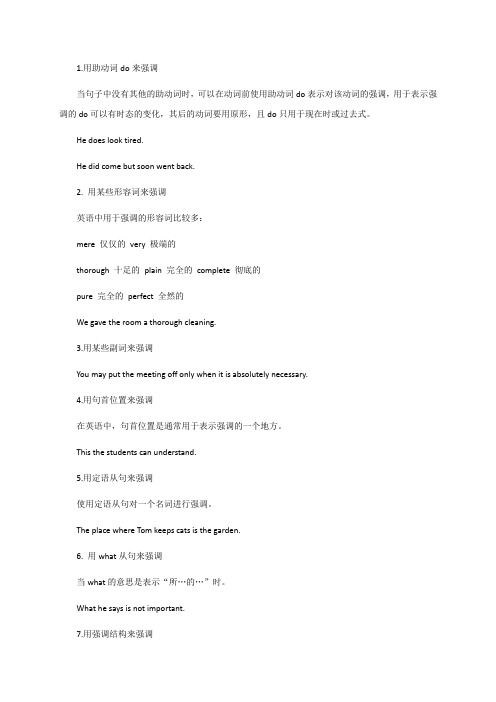
1.用助动词do来强调
当句子中没有其他的助动词时,可以在动词前使用助动词do表示对该动词的强调,用于表示强调的do可以有时态的变化,其后的动词要用原形,且do只用于现在时或过去式。
He does look tired.
He did come but soon went back.
2. 用某些形容词来强调
英语中用于强调的形容词比较多:
mere 仅仅的very 极端的
thorough 十足的plain 完全的complete 彻底的
pure 完全的perfect 全然的
We gave the room a thorough cleaning.
3.用某些副词来强调
You may put the meeting off only when it is absolutely necessary.
4.用句首位置来强调
在英语中,句首位置是通常用于表示强调的一个地方。
This the students can understand.
5.用定语从句来强调
使用定语从句对一个名词进行强调。
The place where Tom keeps cats is the garden.
6. 用what从句来强调
当what的意思是表示“所…的…”时。
What he says is not important.
7.用强调结构来强调
“it is (was)+被强调成分+that (who)+其他”结构。
It was not until I met you that I knew real happiness.。
高中英语知识点归纳强调句的常见句型

高中英语知识点归纳强调句的常见句型强调句是英语中一种常用的语法结构,用于强调句子中的某个成分,使其更加突出、重要。
在高中英语中,掌握强调句的常见句型对于提高语言表达能力至关重要。
本文将归纳总结高中英语知识点,介绍强调句的常见句型和用法。
一、强调句的基本结构强调句的基本结构是“It is/was + 被强调成分 + that/who + 句子其余部分”。
其中,“It is/was”是强调句的引导词,后接被强调的成分,紧跟引导词的是连接词“that/who”,然后是句子的其余部分。
例如:1. It is Peter who won the first prize in the competition.强调句中的被强调成分是Peter,表示彻底强调他赢得了比赛的第一名。
2. It was in the library that I found the book I was looking for.强调句中的被强调成分是in the library,表示特别强调我找到书的地方。
二、强调句的常见句型1. 强调主语强调句中的被强调成分是主语时,常使用以下句型:It is/was + 被强调的主语 + that/who + 句子其余部分例如:It was Mary who broke the window.是玛丽打破了窗户。
2. 强调宾语强调句中的被强调成分是宾语时,常使用以下句型:It is/was + 被强调的宾语 + that/who + 句子其余部分例如:It was Tom who I saw at the park.是我在公园看到的是汤姆。
3. 强调地点状语强调句中的被强调成分是地点状语时,常使用以下句型:It is/was + 被强调的地点状语 + that/where + 句子其余部分例如:It was in the kitchen that I found the missing keys.是在厨房里我找到了丢失的钥匙。
高中英语语法:特殊句式 之强调句

高中英语语法:特殊句式之强调句一、It is ...that/who 强调句1、基本结构:“It is/was +被强调部分+that/who+其他成分”强调句结构可用来强调句子的主语、宾语和状语等。
◇It was a European chemistwho produced the medicine.(强调主语)是一位欧洲药剂师发明了这种药。
◇It was him that we met at the school gate.(强调宾语)我们在学校门口见到的是他。
◇It was at three o'clock that we finished the work(强调状语)我们是在三点钟完成工作的。
★ 2、who/that的选用强调句中,引导词一般用that,that只起连接作用,没有实际意义,而且不能够省略掉。
指人时,that可以用who替代,其他情况下均用that。
◇It is our parents who/that we depend on when we are in trouble.当我们遇到困难时是我们的父母值得依靠。
(所强调的是人,所以who和that都可以用)◇It is a wallet that he picked up.他捡起来的是一个钱包。
(所强调的wallet是物,只能用that)3、is/was的选用原句谓语动词是过去的某种时态时,被强调部分用“It was...”;原句为现在的某种时态时,被强调部分用“It is...”。
4、主谓一致强调句中被强调部分如果是句子的主语,that/who之后的谓语动词在人称和数词上应与被强调的主语保持一致。
◇It is you whoare in charge of it.是你应该为此负责。
◇It is I who am to blame for the fault.是我应该因这个过失而受责备。
辨析:强调句和其他从句的区别一般来说,如果把句子中的It is/was ...that/who...去掉后稍加调整语序,能还原成完整的句子,并且句子意思依然完整,则为强调句。
高中英语强调句精讲
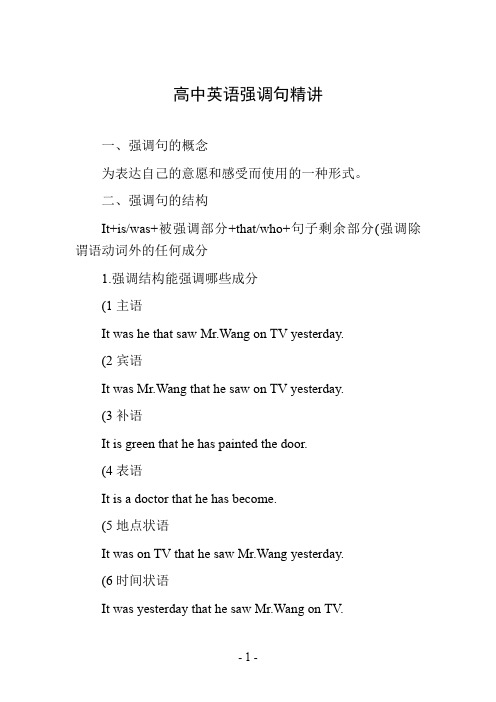
高中英语强调句精讲一、强调句的概念为表达自己的意愿和感受而使用的一种形式。
二、强调句的结构It+is/was+被强调部分+that/who+句子剩余部分(强调除谓语动词外的任何成分1.强调结构能强调哪些成分(1主语It was he that saw Mr.Wang on TV yesterday.(2宾语It was Mr.Wang that he saw on TV yesterday.(3补语It is green that he has painted the door.(4表语It is a doctor that he has become.(5地点状语It was on TV that he saw Mr.Wang yesterday.(6时间状语It was yesterday that he saw Mr.Wang on TV.(7方式状语It was by bike that we went to the park.(8各类从句It was what he said that surprised me.It was because the book was so useful for my work that I bought it.(9强调not…until..中的时间状语It was not untill his father came back home that he went to bed.原句:he didn’t go tobed until his father came back home.(10强调非谓语动词It was playing computer games that cost the boy a lot of money.2.强调结构的疑问式及其回答(1一般疑问句Was it you who put these books on my desk?原句:Did you put these books on my desk?(2特殊疑问句Who was it that gave you the book?原句:Who gave you the book?(3反意疑问句It was Tom who broke the window,wasn’t it?原句:Did Tom break the wind ow,didn’t he?13.强调结构的几个易错点(1关于结构中的that除强调主语和宾语的人时可用who,其他任何情况都用thatIt was Kate that/who told me about it.(2关于结构中be的形式原句谓语动词是过去式时,强调句中的be用was;原句谓语动词是现在时或将来时,强调句中的be用is.注:be有时与表示推测的情态动词连用It must be John that/who cleand the room.(3关于主谓一致问题被强调的是原句主语时,要注意that/who后的谓语动词与原句主语一致。
高中英语强调句解析
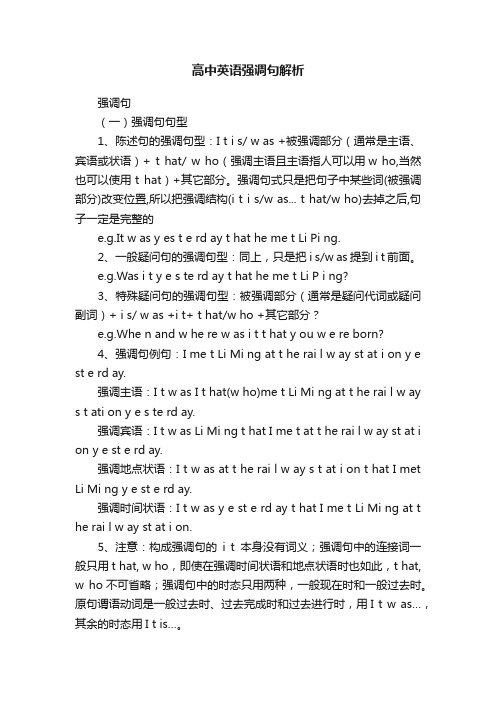
高中英语强调句解析强调句(一)强调句句型1、陈述句的强调句型:I t i s/ w as +被强调部分(通常是主语、宾语或状语)+ t hat/ w ho(强调主语且主语指人可以用w ho,当然也可以使用t hat)+其它部分。
强调句式只是把句子中某些词(被强调部分)改变位置,所以把强调结构(i t i s/w as... t hat/w ho)去掉之后,句子一定是完整的e.g.It w as y es t e rd ay t hat he me t Li Pi ng.2、一般疑问句的强调句型:同上,只是把i s/w as提到i t前面。
e.g.Was i t y e s te rd ay t hat he me t Li P i ng?3、特殊疑问句的强调句型:被强调部分(通常是疑问代词或疑问副词)+ i s/ w as +i t+ t hat/w ho +其它部分?e.g.Whe n and w he re w as i t t hat y ou w e re born?4、强调句例句:I me t Li Mi ng at t he rai l w ay st at i on y e st e rd ay.强调主语:I t w as I t hat(w ho)me t Li Mi ng at t he rai l w ay s t ati on y e s te rd ay.强调宾语:I t w as Li Mi ng t hat I me t at t he rai l w ay st at i on y e st e rd ay.强调地点状语:I t w as at t he rai l w ay s t at i on t hat I met Li Mi ng y e st e rd ay.强调时间状语:I t w as y e st e rd ay t hat I me t Li Mi ng at t he rai l w ay st at i on.5、注意:构成强调句的i t本身没有词义;强调句中的连接词一般只用t hat, w ho,即使在强调时间状语和地点状语时也如此,t hat, w ho不可省略;强调句中的时态只用两种,一般现在时和一般过去时。
- 1、下载文档前请自行甄别文档内容的完整性,平台不提供额外的编辑、内容补充、找答案等附加服务。
- 2、"仅部分预览"的文档,不可在线预览部分如存在完整性等问题,可反馈申请退款(可完整预览的文档不适用该条件!)。
- 3、如文档侵犯您的权益,请联系客服反馈,我们会尽快为您处理(人工客服工作时间:9:00-18:30)。
高中英语强调句强调是有效地进行思想交流的重要手段之一。
人们在交际过程中,为了使自己的思想能为听者或读者恰当的理解,必须突出重要的内容,这就需要运用强调的手段。
一、强调手段在现代英语中,人们可以通过语音手段、词汇手段、语法手段来进行强调。
A. 语音手段在口语中,人们可以根据交流的需要,通过语句重音来对不同的词语进行强调。
例如She speaks English well 这句话,可以通过语句重音来分别对不同的词进行强调。
A Shall we ask Jennifer or Robin to host the English evening partyB Of course Jennifer. She speaks English well. (重读She,强调“她”)A Jennifer's been living in Australia for two years.B She speaks English well but her writing is not very good. (重读speaks,强调“说”)A Jennifer speaks French beautifully.B She speaks English well, too. (重读English,强调“英语”)A Do you think Jennifer is fit for the jobB Certainly. She speaks English well. (重读well,强调“好”)B. 词汇手段人们常用一些形容词、副词、否定词等词汇手段来加强语气。
1.形容词very 放在the, this, that 或代词所有格my, his等后面, 强调后边所修饰的名词。
You are the very person I want to chat with. 你就是我要聊天的那个人。
He is the very picture of his father. 他活像他父亲。
At that very moment the policemen came. 就在那时警察到了。
2.副词just 放在the, this, that 或代词所有格my, his等前面,强调the, this, that,my, his所修饰的名词。
This is just the book I am looking for. 这就是我在寻找的书。
He is just the right person for the job. 他就是适合做这份工作的人。
3.用whatever, whenever, wherever 等分别加强what, when, where等词的语气。
What is left over is yours. 剩下来的是你的。
-- Whatever is left over is yours. 剩下来所有的都是你的。
When did you find time to do it 你什么时候有空做这事?-- Whenever did you find time to do it 你究竟什么时候有空做这事?Where are you going 你到哪里去?-- Wherever are you going 你究竟到哪里去?Who can that be 那会是谁呢?Whoever can that be 那究竟会是谁呢?nn4.副词possibly 用于否定句或疑问句情态动词cancould后,加强否定或疑问的语气,有“无论如何, 不管怎样”的意思。
We cannot do it. 那件事我们不能做。
-- We cannot possibly do it. 那件事我们无论如何也不能做。
He can't forget it. 他不会忘记此事。
-- He can't possibly forget it. 他无论如何也不会忘记此事。
Could he agree 他会同意吗?Could he possibly agree 难道他会同意吗?n5.副词simply 用于加强语气,表示“真正,的确,非常,简直,完全”等意思。
It is beautiful. 这很美。
-- It is simply beautiful. 这的确是美。
I can't go such stupid behavior. 我不能接受如此愚蠢的行为。
I simply can't go such stupid behavior. 对这种愚蠢的行为我实在忍受不了。
6.副词out, up, over 等加强语气。
①副词out 放在介词短语的前面, 指“较远”的地方,如郊区或远方农村等。
I am living in the country. 我住在乡下。
-- I am living out in the country. 我住在乡下。
We will sail to the island. 我们将出海前往该岛。
--We will sail out to the island. 我们将出海远航,前往该岛。
②副词up 经常与go ,run, walk, come等动词连用,由远及近地“从某处来”,“到某处去”。
A stranger came to me and asked the way. 一个陌生人向我走来问路。
-- A stranger came up to me and asked the way. 一个陌生人走到我跟前来问路。
Please bring the things to my office. 请把这些东西拿到我办公室来。
-- Please bring the things up to my office. 请把这些东西拿到我办公室来。
③副词over经常与go, run, walk, come等动词连用,强调跨越一段距离。
I will go to his office and have a talk with him. 我要去他办公室和他谈谈。
I will go over to his office and have a talk with him. 我要去他办公室和他谈谈。
7. 将on earth, in the world, in heaven, under the sun 等短语放在what, when, which, who, where, how 等词的后面,加强语气。
When did you send the email to him?你什么时候发的电子邮件给他?-- When on earth did you send the email to him?你究竟是什么时候发电子邮件给他的?What do you mean by saying so 你这么说是什么意思?-- What in heaven do you mean by saying so?你这么说到底是什么意思?Where could he be 他可能在哪里?--Where in the world could he be 他究竟在哪里?8.用反身代词表示强调。
You can go there yourself. 你自己可以去那里。
The president himself will chair the meeting. 总统将亲自主持这个会议。
I am a stranger here myself. 我自己在这里也是个陌生人。
9.much, far, by far, still, even, a great deal, a lot放在形容词或副词比较级的前面,用来加强语气。
This building is much larger than that one. 这幢楼房比那幢楼房大得多。
His composition is far better than mine. 他的作文比我的作文好多了。
That would be a great deal better. 那就更好了。
注意:by far 要放在最高级或带the的比较级前,但如果比较级前面无定冠词,by far放在比较级前后均可。
He is by far the tallest student in the class. 他是班上最高的学生。
It is by far the longer river of the two. 这是两条河中较长的一条。
This is better by far. 这个要好多了。
10. 用重复某一个单词来表示强调。
It's very, very unkind of you, isn't it 你非常非常不友善,不是吗?We waited and waited, but nothing happened. 我们等来等去,但什么事也没发生。
I haven't seen him for years and years and years. 我已经好几年没见到他了。
11. 用not a single, not a bit, not simply, by no means 等短语来加强否定的语气。
She's not in the least angry with me. 她一点也不生我的气。
I can't speak a single word of Japanese. 我就连一个日语单词也不会说。
She is by no means diligent. 她根本不勤奋。
比较:not a bit 一点也不(= not at all);not a little 非常(= very much)He was not a bit tired. 他一点不累。
He was not a little tired. 他非常累。
12. 用none来表示强调。
1This is none of your business. 这与你丝毫没有关系。
He is none of my friends. 他决不是我的朋友。
B. 语法手段1. 通过改变句子结构或颠倒正常语序的手段来进行强调。
Happy are those who are content. 知足常乐。
Never will China be the first to use nuclear weapons. 中国决不会第一个使用核武器。
Across the river lies a newly-built bridge. 河上有一座新建的桥。
Hero as he is, he still remains modest. 尽管他是英雄,他仍然很谦虚。
2. 用助动词do, does或did来强调谓语动词。
